| Downloads count | 6 |
| Resource type | Lesson |
| Recommended age | 4 - 13 years |
| File information | 1:11 mp4, 6.54 MB |
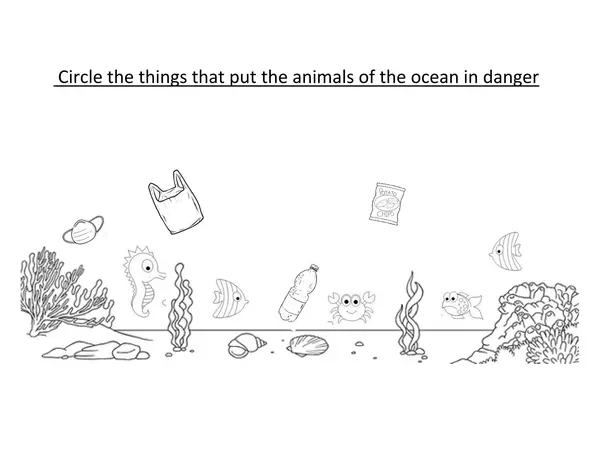
| Downloads count | 1 |
| Resource type | Worksheet |
| Recommended age | 4 - 6 years |
| File information | pdf, 2 pages, 371 KB |
This activity will let us learn about the damage that the trash makes to ocean and for the animals that lives there. It is importante to create this awareness since a young age in order to make them respect the water and the living things that are in there.
First you will watch a video called "A whale´s tale" https://www.youtube.com/watch?v=xFPoIU5iiYQ and after that you will have to print a worksheet and circle the thing that can damage the ocean!!
Let´s all work together to take care of the water!!!
There are no comments yet, write one yourself!
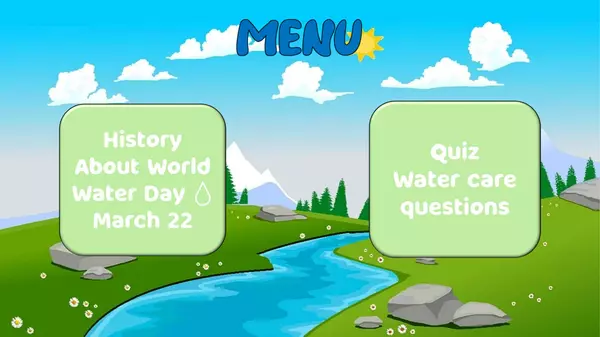
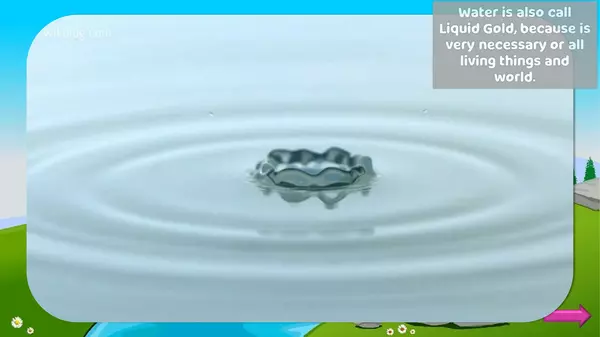
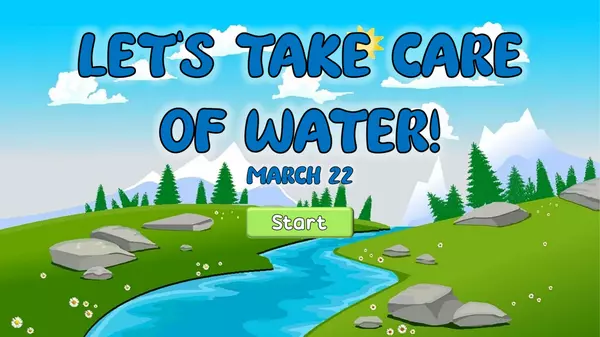
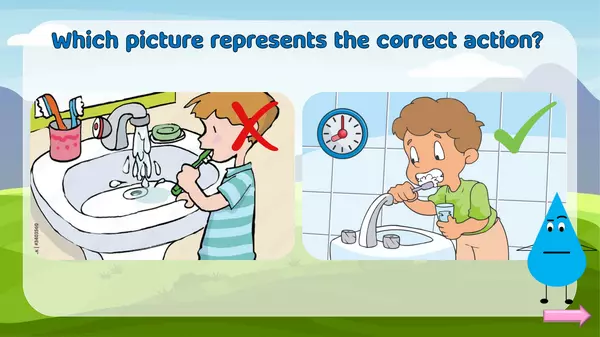
| Downloads count | 3 |
| Resource type | Activity |
| Recommended age | 4 - 8 years |
| File information | Private link to drive.google.com |
Contiene:
▪ Video Explicativo sobre el tema▶
▪ Juegos de Preguntas📝
!Espero les guste y les sea de utilidad¡😉👍
(Está prohibida su venta en Profe Social y en otras plataformas, ya que infringe la propiedad intelectual y derecho de autor)
There are no comments yet, write one yourself!
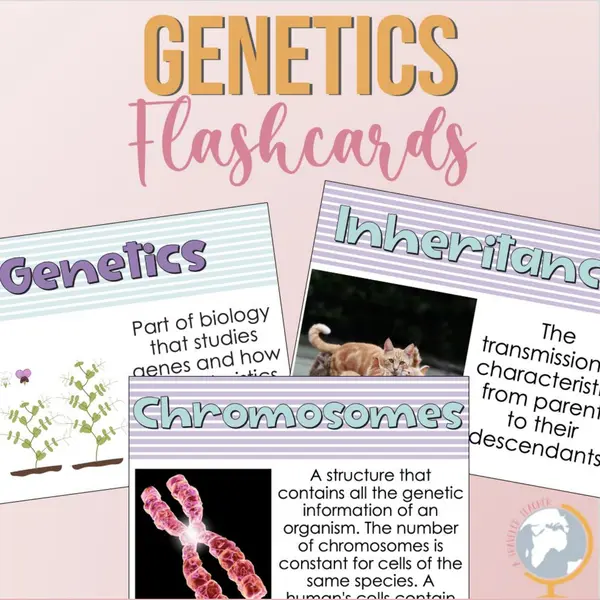
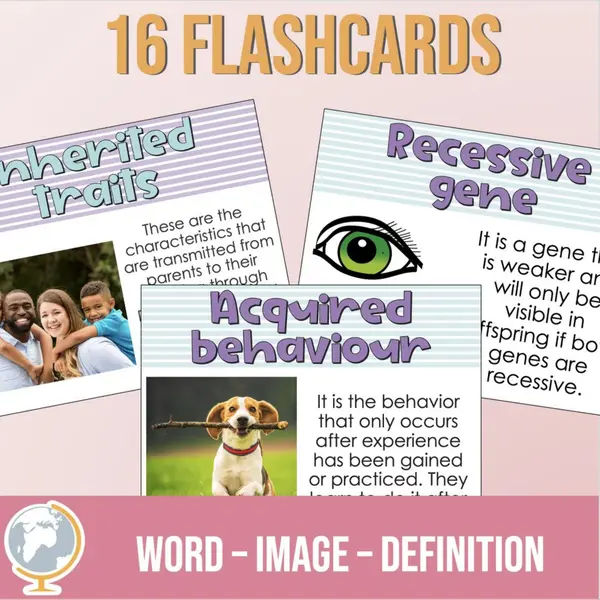
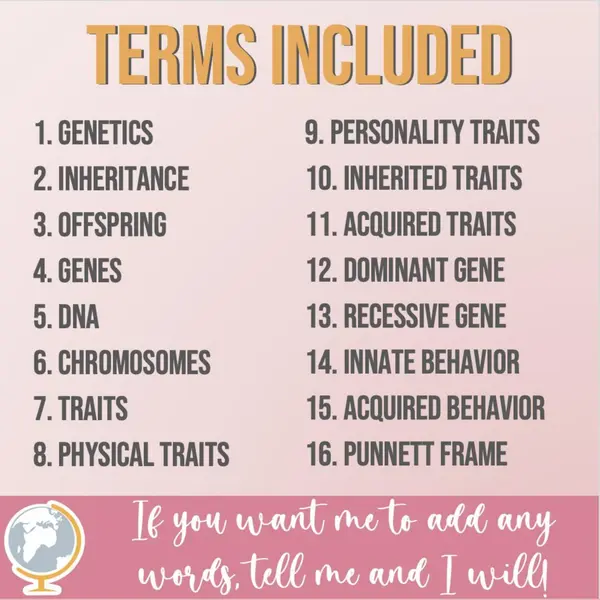
| Resource type | Activity |
| Recommended age | 10 - 13 years |
| File information | Private link to docs.google.com |
- Memory
- Around the world
- Cowboys
- Charades
- Pictionary
- Describe and guess
- Oh! No!
- Listen and pick
- Inflatable hammer
- Big bag toss
- Genetics
- Heredity
- Offspring
- Genes
- DNA
- Chromosomes
- Traits
- Physical traits
- Personality traits
- Inherited traits
- Acquired traits
- Dominant gene
- Recessive gene
- Innate behavior
- Acquired behavior
- Punnett square
- For early finishers: Place the vocabulary cards in a designated area of the classroom and allow students who finish their tasks early to play a quick game, like "Pairs" or "Describe and Guess," to review the vocabulary while they wait for others.
- Science class center: Set up a learning center where students can rotate between different games, like "Charades" or "Pictionary," using the cards to reinforce key vocabulary. This is a fantastic way to review terms in small groups.
- Whole-class activity: Divide students into teams, give each team a set of cards, and have them compete in games like "Around the World" or "Target Practice" to see who can master the most terms. A fun and competitive way to review important concepts!
- Quick games to start or end the class: Use games like "Oh Snap!" or "Inflatable Hammer" at the beginning or end of class for a quick, fun review of vocabulary. Perfect for breaking the ice or reinforcing terms before a quiz.
- Vocabulary tournament: Organize a weekly game tournament using the cards. Each week, teams compete in different games (like "Cowboys" or "Listen and Pick") and earn points. At the end of the month, the team with the most points gets a prize or recognition.
There are no comments yet, write one yourself!
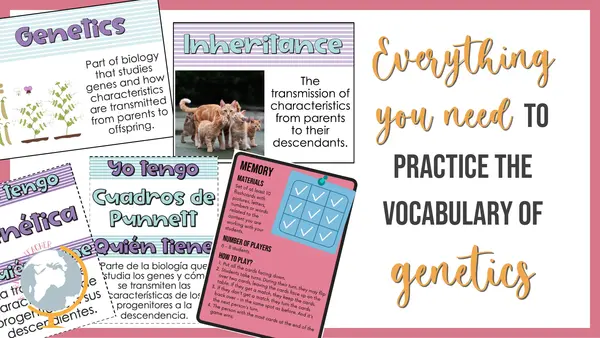
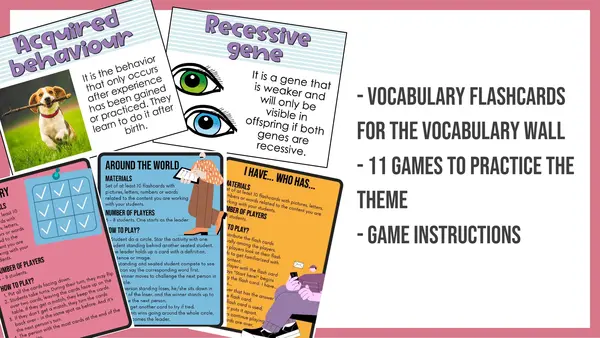
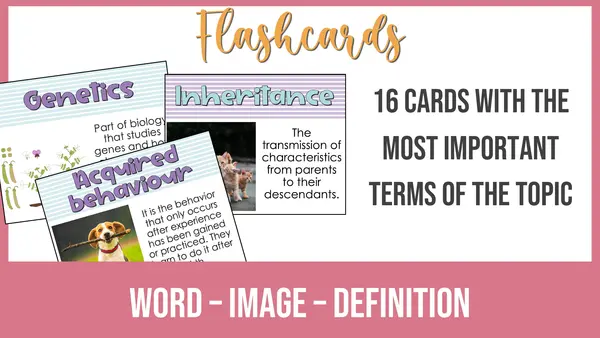
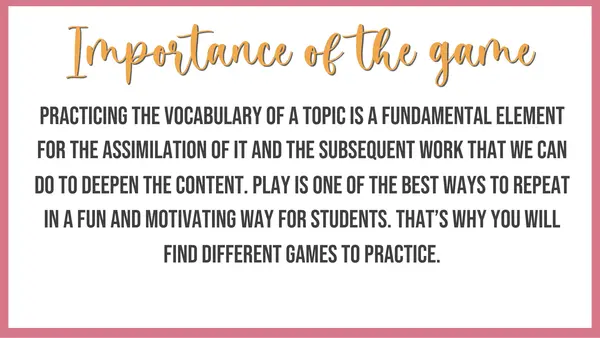
| Resource type | Activity |
| Recommended age | 9 - 13 years |
| File information | Private link to docs.google.com |
- Memory
- Around the world
- Cowboys
- Charades
- Pictionary
- Describe and guess
- Oh! No!
- Listen and pick
- Inflatable hammer
- Big bag toss
- Genetics
- Inheritance
- Offspring
- Genes
- DNA
- Chromosomes
- Traits
- Physical Traits
- Personality Traits
- Inherited Traits
- Acquired Traits
- Dominant Gene
- Recessive Gene
- Innate Behavior
- Acquired Behavior
- Punnett Square
- Active Word Wall: Use the cards to create a word wall in your classroom, adding new words each week. Students can refer to the wall during genetics lessons or related activities.
- Vocabulary Scavenger Hunt: Organize a treasure hunt in your classroom where students search for vocabulary cards that match definitions or examples you provide.
- For Early Finishers: Place the vocabulary cards in a designated area of the class, and allow early finishers to play a quick game like "Matching Pairs" or "Describe and Guess" to review vocabulary while waiting for others.
- Science Learning Center: Set up a learning center where students rotate through different games like "Charades" or "Pictionary," using the cards to reinforce key vocabulary. It’s a fantastic way to review terms in small groups.
- Whole-Class Activity: Divide students into teams, provide each team with a set of cards, and have them compete in games like "Around the World" or "Target Practice" to see who can master more terms. A competitive and exciting way to review important concepts!
- Quick Games at the Start or End of Class: Use games like "Oh No!" or "Inflatable Hammer" at the beginning or end of class for a quick, fun review of vocabulary. Perfect for breaking the ice or reinforcing terms before a test.
- Vocabulary Tournament: Organize a weekly game tournament using the cards. Each week, teams compete in different games (like "Cowboys" or "Listen and Choose"), accumulating points. At the end of the month, the team with the most points wins a prize or recognition.
There are no comments yet, write one yourself!
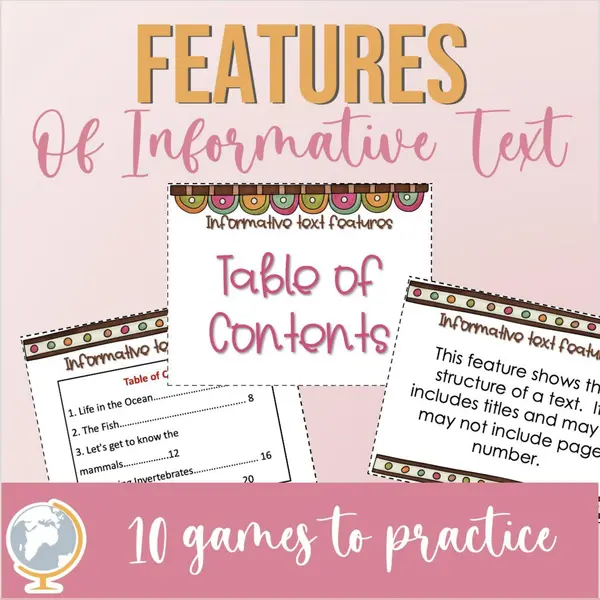
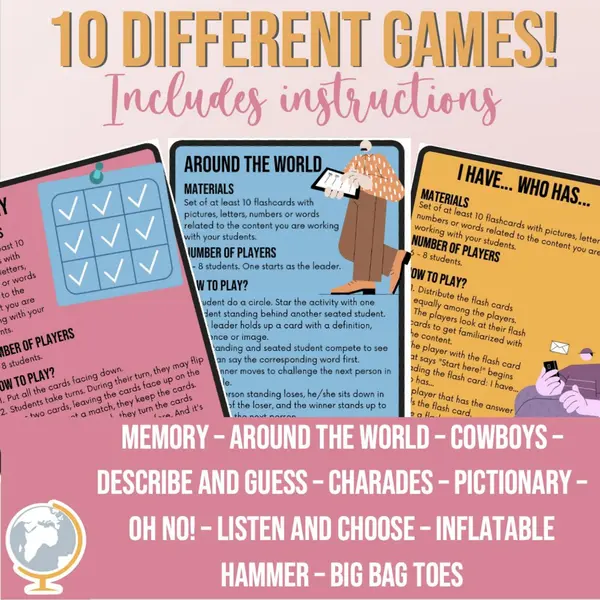
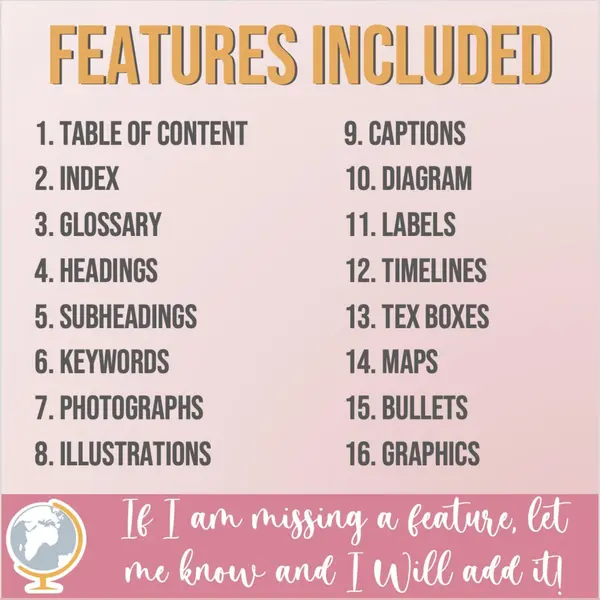
| Resource type | Activity |
| Recommended age | 9 - 13 years |
| File information | pdf, 7 pages, 924 KB |
- Memory
- Around the world
- Cowboys
- Charades
- Pictionary
- Describe and guess
- Oh! No!
- Listen and pick
- Inflatable hammer
- Big bag toss
- Table of contents
- Index
- Glossary
- Heading
- Subheadings
- Keywords
- Photographs
- Illustrations
- Captions
- Diagram
- Labels
- Timelines
- Text Boxes
- Maps
- Bullets
- Graphics
- For early finishers: Place the vocabulary cards in a designated area of the classroom and allow students who finish their tasks early to play a quick game, like "Pairs" or "Describe and Guess," to review the vocabulary while they wait for others.
- Science class center: Set up a learning center where students can rotate between different games, like "Charades" or "Pictionary," using the cards to reinforce key vocabulary. This is a fantastic way to review terms in small groups.
- Whole-class activity: Divide students into teams, give each team a set of cards, and have them compete in games like "Around the World" or "Target Practice" to see who can master the most terms. A fun and competitive way to review important concepts!
- Quick games to start or end the class: Use games like "Oh Snap!" or "Inflatable Hammer" at the beginning or end of class for a quick, fun review of vocabulary. Perfect for breaking the ice or reinforcing terms before a quiz.
- Vocabulary tournament: Organize a weekly game tournament using the cards. Each week, teams compete in different games (like "Cowboys" or "Listen and Pick") and earn points. At the end of the month, the team with the most points gets a prize or recognition.
- Table of contents
- Index
- Glossary
- Heading
- Subheadings
- Keywords
- Photographs
- Illustrations
- Captions
- Diagram
- Labels
- Timelines
- Text Boxes
- Maps
- Bullets
- Graphics
- Text Feature
- Definition
- Example
There are no comments yet, write one yourself!
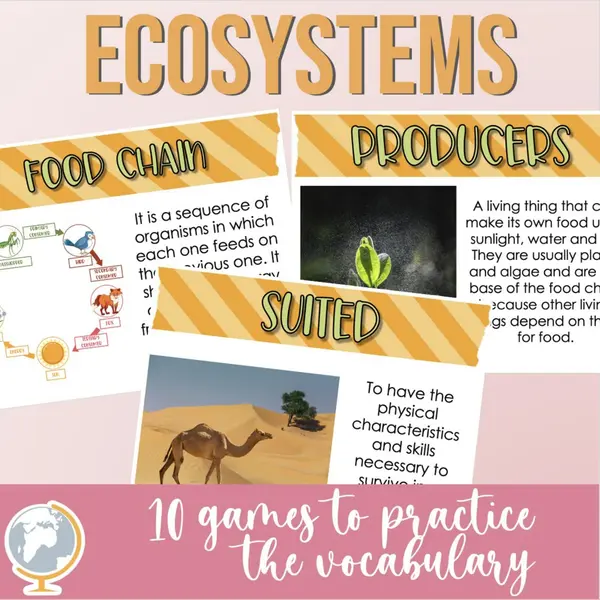
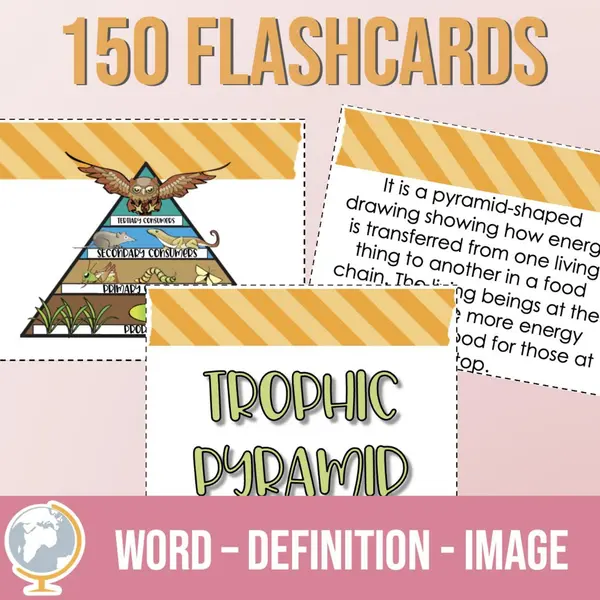
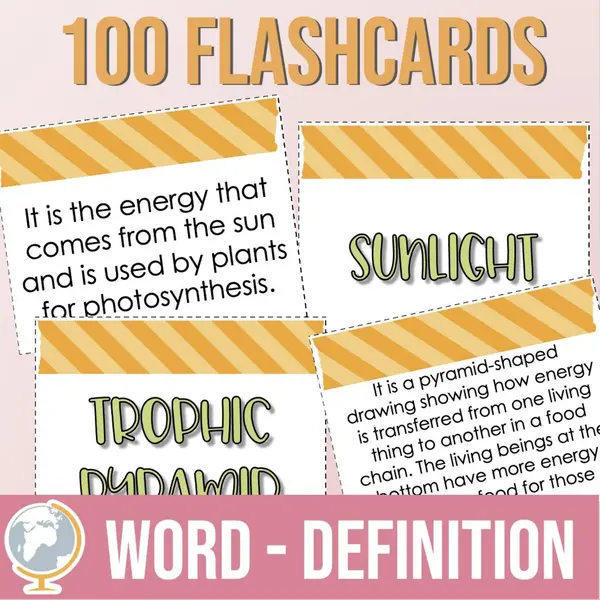
| Resource type | Activity |
| Recommended age | 9 - 13 years |
| File information | pdf, 7 pages, 973 KB |
- Memory
- Around the world
- Cowboys
- Charades
- Pictionary
- Describe and guess
- Oh! No!
- Listen and pick
- Inflatable hammer
- Big bag toss
- Food chain
- Food web
- Trophic pyramid
- Trophic levels
- Producers
- Consumers
- Primary consumer
- Secondary consumer
- Tertiary consumer
- Decomposers
- Herbivore
- Carnivore
- Omnivore
- Scavenger
- Individual
- Population
- Community
- Ecosystem
- Habitat
- Suited
- Survive
- Thrive
- Competition
- Adaptation
- Organism
- Biotic
- Abiotic
- Biome
- Terrestrial biome
- Aquatic biome
- Estuary
- Lake
- Ocean
- River
- Deciduous forest
- Rainforest
- Savanna
- Taiga
- Tundra
- Desert
- Photosynthesis
- Root
- Stem
- Leaf
- Sunlight
- Water
- Air
- Oxygen
- Carbon dioxide
- Glucose
- For early finishers: Place the vocabulary cards in a designated area of the classroom and allow students who finish their tasks early to play a quick game, like "Pairs" or "Describe and Guess," to review the vocabulary while they wait for others.
- Science class center: Set up a learning center where students can rotate between different games, like "Charades" or "Pictionary," using the cards to reinforce key vocabulary. This is a fantastic way to review terms in small groups.
- Whole-class activity: Divide students into teams, give each team a set of cards, and have them compete in games like "Around the World" or "Target Practice" to see who can master the most terms. A fun and competitive way to review important concepts!
- Quick games to start or end the class: Use games like "Oh Snap!" or "Inflatable Hammer" at the beginning or end of class for a quick, fun review of vocabulary. Perfect for breaking the ice or reinforcing terms before a quiz.
- Vocabulary tournament: Organize a weekly game tournament using the cards. Each week, teams compete in different games (like "Cowboys" or "Listen and Pick") and earn points. At the end of the month, the team with the most points gets a prize or recognition.
There are no comments yet, write one yourself!
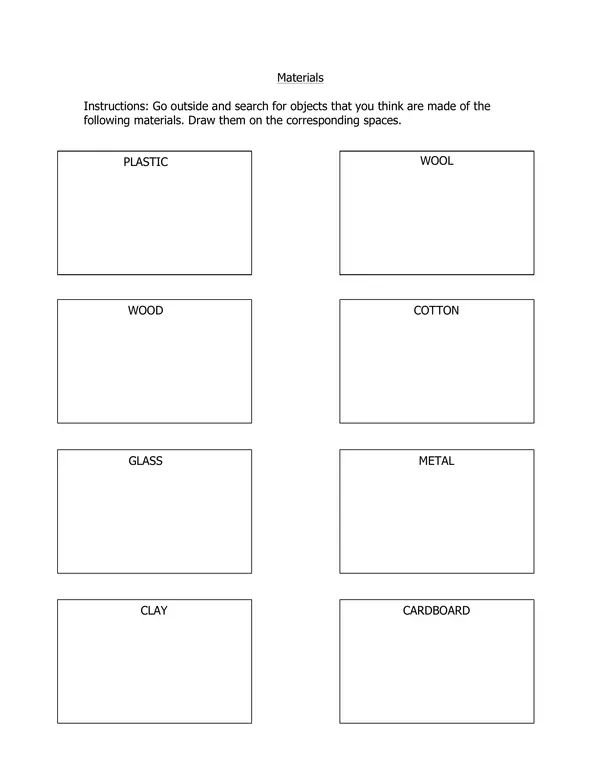
| Resource type | Worksheet |
| Recommended age | 6 - 7 years |
| File information | pdf, 1 pages, 95.9 KB |
I love to take my students out, to another classroom or a different teaching stage. The idea is to go wherever you want and try to find different objects that are made of those materials. There are some objects that they might not be sure, but it doesn't matter, just what they think!
Before they go to a place, make sure there are objects for every material, and if not, place some in different locations.
At the end of the class, discuss with them what they found.
I did this activity with my friend Carmen Ortúzar.
There are no comments yet, write one yourself!
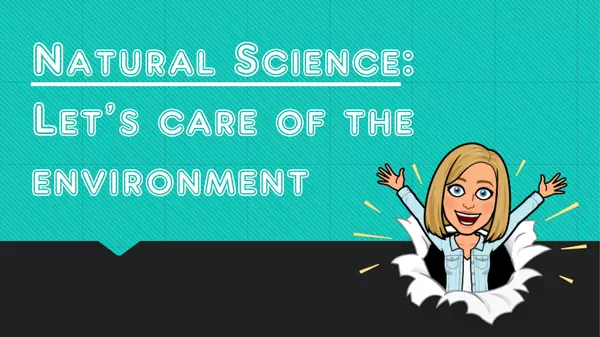
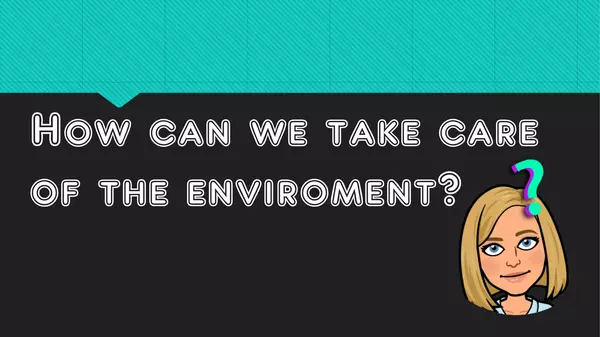
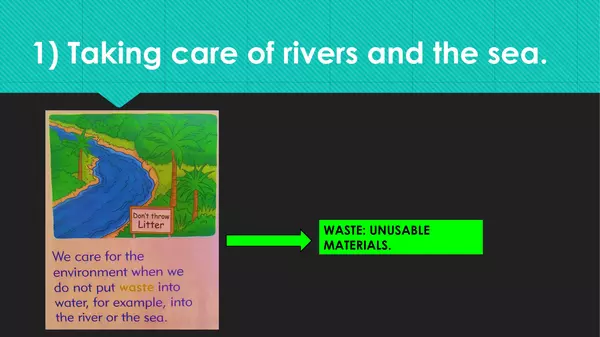
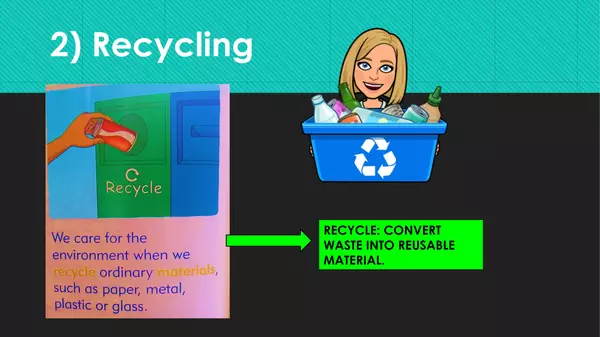
| Downloads count | 7 |
| Resource type | Activity |
| Recommended age | 8 - 10 years |
| File information | pptx, 8 pages, 8.22 MB |
At the end of the examples, the idea is to ask them if they know any other action that could help to take care of the environment. Then, there is a True of False activity to complete.
It is very important that students understand and see how they can help with little and ordinary actions, which can make a big change and difference.
There are no comments yet, write one yourself!
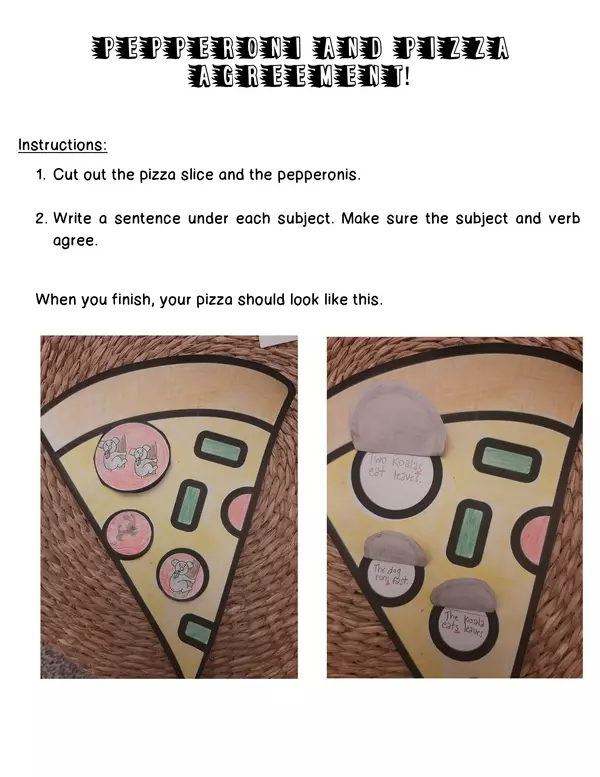
| Resource type | Activity |
| Recommended age | 6 - 8 years |
| File information | pdf, 2 pages, 514 KB |
This idea was taken from Pinterest. It is a fun activity that students enjoy a lot, because it is a different way to learn and apply grammar rules, rather than completing a worksheet. Besides, children love pizza! So they get really engaged with the activity by just looking at the title. They need to "build" the slice of pizza by pasting the pepperonis as flaps on the corresponding spaces, and following the instructions. They must also colour the pepperonis and the slice of pizza.
Make sure you review the content before having the students work on the craft.
There is a picture on two of the pepperonis (they have different sizes), and students need to write a coherent sentence, according to each picture, on the corresponding space, and then they need to paste the pepperoni as a "flap" on its space (for example, if there is one dog running on one of the pepperonis, they need to write "The dog runS" on the space of that pepperoni).
There is one of the pepperonis that does not have a picture, because students need to create their own picture and sentence.
There are no comments yet, write one yourself!
There are no comments yet, write one yourself!